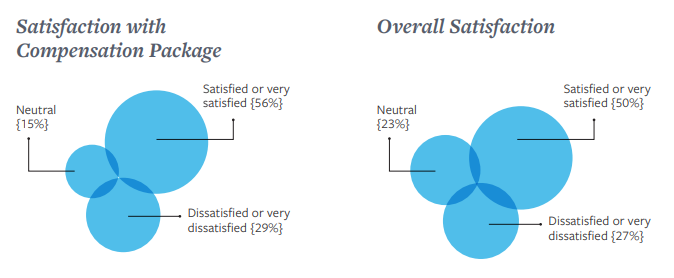Analysis
Copier Careers 2017 Sales Manager Salary Survey

Despite an average increase in compensation of 4.7 percent last year, more than 90 percent of those who responded to our 2017 Sales Manager Salary Survey say they are looking for a new job — and that’s not as contradictory as it seems.
Why the discontent? “Being a sales manager is a very hard job,” said Paul Schwartz, president of Copier Careers®, a recruiting firm that works exclusively with Copier Channel employers and candidates. “Over a few years, the industry has evolved from selling and servicing copy machines into providing complex IT solutions. Everything changed, and sales managers are at the epicenter of that change.”
In the evolved marketplace, many dealers are trying to increase market share by going after new business. That creates pressure on sales managers to build and lead teams that can sell new solutions. “The channel just grows,” Schwartz said. “There are always more solutions and services to sell. Having the capacity and sales team to do that well clearly has an effect on the job satisfaction of sales managers. Their job is like a balancing act on a tightrope.”
The 2017 Sales Manager Salary Survey
Over the past 15 years, Copier Careers, the only nationwide recruiting firm dedicated exclusively to the Copier Channel, has asked professionals from across the industry about their compensation, job satisfaction and other work-life issues. This year 1,348 Copier Channel sales managers from across the industry participated in our survey, an increase of 149 participants. Their responses reflect an industry that is increasingly an IT-based channel and the challenges that ongoing change creates for sales managers.
Copier Sales Managers by the Numbers
The responses of 1,348 sales managers to our online Sales Manager Salary Survey created a snapshot of a career track with myriad opportunities and nearly as many frustrations.
Ninety-one percent of those who took our 2017 Sales Manager Salary Survey said they are “actively” or “somewhat” looking for a new job, even though more than half (56 percent) rated their overall satisfaction as “satisfied” or “very satisfied.”
Of those responding, 100 percent said they were looking for a new job because they want higher compensation. Ninety-one percent also said there are job market opportunities too good to pass up.
Some discontent might arise from the rapid pace of change in the industry. As new products and solutions emerge, dealers need to update compensation plans for their sales teams and sales managers — especially how recurring revenue is handled. “Who gets which piece of the pie is an issue,” Schwartz said. “There has been a steep learning curve to find the sweet spot on compensation.”
In 2017, the average base salary for sales managers was up $3,547, and commissions increased an average of $3,606. This reflects the continuing high demand for sales managers with technology and solutions knowledge. It also indicates that copier dealers are aware that they need to increase compensation
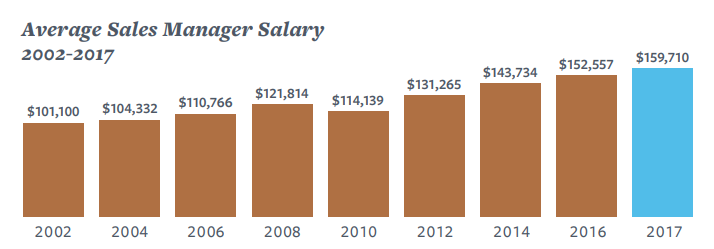
2017 Salary and Benefits
The average base salary for a Copier Channel sales manager rose to $62,667 this year. Coupled with commissions that averaged $97,043, the average total compensation for sales managers increased to $159,710.
Even though 56 percent of survey respondents said they are “very satisfied” or “satisfied” with their total compensation, it may pose a concern for dealers, because that means 44 percent of the sales managers said they are “very dissatisfied,” “dissatisfied” or “neutral” with their total compensation package.
The dissatisfaction might arise from each dealer’s need to create compensation packages for selling and servicing complex solutions that often have long-term leases, as opposed to a set percentage of the sale of a single machine in the “old” days.
“The industry has gone through a lot of trial and error and frustration on how to compensate sales of software solutions and make it fair for everyone,” Schwartz said. “They have made headway, but ongoing changes in the industry have led to a lot of
frustration.
“Companies realize they need to compensate more to keep good people, because the market is tight,” Schwartz said. “They have to be careful, because when so many sales managers say they are unhappy with their compensation, it will create movement. And it won’t be hard to place them, because everybody is looking to hire good sales managers.”


When asked about their “overall satisfaction” with their job, 50 percent of respondents in the Sales Manager Salary Survey said they are “satisfied” or “very satisfied.” The other 50 percent described their satisfaction level as “neutral” (23%) or “dissatisfied” or “very dissatisfied” (27%).
Beyond compensation, many sales managers seem to want something more. When asked to select seven factors “that matter most about your job” from a list of 37 variables, the top choices in 2017 were overwhelmingly about “feel good” choices. All respondents (100%) said they want to know that their work is important to the company’s success.” Ninety-one percent want “the ability to work with leading-edge technology,” and 90 percent “want to work on creating new, innovative IT solutions.”
This year’s salary survey also shows sales managers have increased interest in the “how” of their jobs: 81 percent said they want to understand their company’s business strategy; 81 percent expressed a desire to know that their work helps to achieve company goals, and 57 percent want to know that their opinion is acknowledged and valued.
The strength of those responses speaks volumes, Schwartz said. “If you don’t know where you stand, how are you supposed to help advance company goals? For me, that shows commitment and engagement.”

As smaller organizations try to expand their market share, they are hiring more sales reps … and that can create stress for sales managers.
The 1,348 Copier Channel sales managers who took this year’s salary identified where they work by type of copier business: 37 percent work for single-location independent copier dealerships; 27 percent work at multi-location regional dealerships; 22 percent work at OEMs; 10 percent work for national sales and service organizations and 4 percent work for other non-specified Copier Channel employers.
Overall, the survey shows that more than two-thirds of sales managers lead teams of 10 or fewer members. In 2017, those supervising from one to 20 staff members increased slightly from last year.
- 69.2 percent of sales managers supervise from one to 10 people
- 20 percent manage a sales staff of 11-20
- 7 percent lead teams of 21-50
- 4 percent oversee teams of 51-100
“As smaller organizations try to expand their market share, they are hiring more sales reps,” said Jessica Crowley, business development manager and senior recruiter at Copier Careers. “We have seen a focus on building ‘net new teams’ that focus on
going after all new business, not just acquiring new accounts and products, and that can create stress for sales managers.”
In the 15th year of this survey, we found that the education level of sales managers has increased over time. In 2002, the first year of the survey, the highest level of education that respondents reported was OEM training. In 2017, the type of education sales managers report has expanded to degrees from tech or trade schools, associate’s degrees and MBAs.
One thing has remained constant in the past 15 years: Most sales teams in 2002 and today are led by a sales manager with “some college.” However, the increase in IT solutions might change the level of education required to lead sales teams over time.
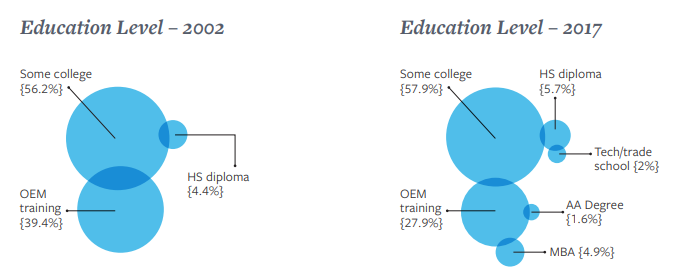
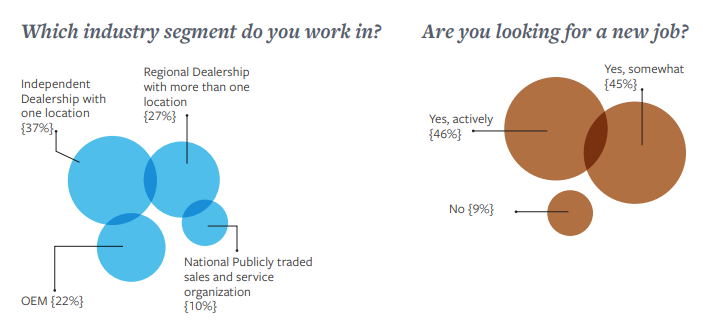
A Good Sales Manager Is Hard to Find
Perhaps the most telling detail from this year’s Salary Survey is that 91 percent of sales managers are “actively” or “somewhat” looking for a new job. Only 9 percent of those who took the survey said they would NOT consider a new opportunity.
For dealership owners and managers the critical question is, “why?”
The answer is simple, Crowley said. “You need to do well with what you sell. Dealers need to have the service and support in place to keep customers happy, otherwise sales people will go somewhere else — because they can.”
Crowley points to some of the frustrations and friction points for sales managers that may create interest in changing jobs:
- A dealer’s inability to deliver service or support for new solutions
- Fair compensation for selling complex new solutions
- A lack of resources to recruit sales reps
- Lack of rewards that make it difficult to retain staff
- The constant need to hire and train new sales reps
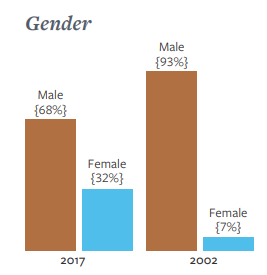
“Sales managers want support not only from management but from all parts of the company: service support, sales support, back office and administration,” Crowley said.
“Everyone needs to be on the same page and have an understanding of company goals, so the sales manager can lead the sales team, sell the solutions and achieve those goals.”
The survey also shows that women now hold nearly a third of the sales manager positions. In 2002, women only held seven percent of Copier Channel sales manager positions.
Dissatisfaction (with compensation) has been consistent over a number of years … companies need to be aware that this is reaching a critical mass.
Should I Stay or Should I Go?
With a high demand for their expertise, Copier Channel sales managers have a wide array of choices, and their responses to this year’s survey indicate that many are considering their options.
“If you look at how sales managers feel about their total compensation, 60 percent of them are unhappy with it,” Schwartz said. “That dissatisfaction has been consistent over a number of years, but the point is that companies have to be aware that this is reaching a critical mass.”
Consider that dissatisfaction with compensation alongside the No. 1 reason that sales managers say they would change jobs, and you see the potential problem. One hundred percent of sales managers responding to this year’s survey say that “higher compensation” is the No. 1 reason they would change jobs.
“Job market opportunities too good to pass up” and dissatisfaction with compensation could create some churn in the industry. “These people want to grow, and they’re going to go where they can grow, sell complete solutions and add value,” Schwartz said.

As the industry evolves, it faces challenges with staffing, training, compensation, recruiting and retention … the downside of a good time for the industry.
That Was Then. This Is Now.
Less than a decade ago, the Copier Channel was considered a training ground for sales reps, who would sell copiers for three to five years and move on to more dynamic industries, such as pharmaceutical or IT sales. Retention was not an expectation.
“It was called ‘putting in your time,’ and they became really good B2B reps and moved on to other more exciting or glamorous industries,” Schwartz said. Then, inside of a decade, it all changed.
“When managed print services and managed network services started evolving, people left other channels to take jobs in the Copier Channel because the array of things you can sell is so wide,” he said.
In 2017, The Copier Channel is relevant, dynamic and adding solutions. Sales managers are scrambling to build sales teams for an array of new products and services, compensation is up and there are abundant opportunities for advancement.
But as the industry evolves, it faces challenges with staffing, training, compensation, recruiting and retention. Sales managers who participated in this year’s survey point to those challenges as the downside of a good time for the industry. Ironically, the downside also creates opportunities in the Copier Channel — for dealers to recruit top talent.
“The top performers want the right fit, and they have opportunities to find it,” Schwartz said. “We tell our clients that timing is everything. When candidates are actively looking is the best time to have a conversation and to make room for talent.”
And for sales managers ready to move on, he says: “If you can sell anything to anybody, who wouldn’t want to be in this industry?” Good question. What do you say?
Stay Tuned for Our Other 2017 Salary Surveys
- August – Service and Operations Managers Salary Survey
- December – Sales Representatives Salary Survey
In Case You Missed It
Check our our 2017 Copier Tech Salary Survey
ABOUT US
Copier Careers® is a recruiting firm dedicated exclusively to helping Copier Channel employers find experienced service techs, copier sales reps, sales managers, service and operations managers, controllers, back-office staff and MPS/MNS experts. Learn more about our commitment to the Copier Channel at www.CopierCareers.com, or call 888-733-4868 to speak with a recruiter.
Copyright 2017, Copier Careers®. All rights reserved


